Civil Liberties, Criminalizing Dissent, Human Rights, NSA Spying, Political Prisoner, Prison Industry, Surveillance, Targeting Muslims, War Resister
Podcast: Play in new window | Download
Updates:
- Volkswagen Could Face Up to $80 Billion in Penalties From U.S. Emissions Lawsuit
- Co-host Heidi Boghosian Reads A Poem By Bill Ayers
—-
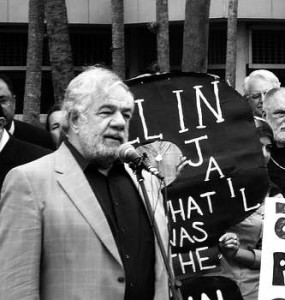
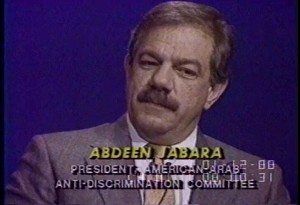
Lawyers You’ll Like: Attorney Abdeen Jabara
Abdeen Jabara is a New York based civil rights attorney and co-founder of the American-Arab Anti-Discrimination Committee. He was involved in a groundbreaking court case in the 1970s that forced the NSA to acknowledge it had been spying on him since 1967. At the time of the spying, Abdeen was a lawyer in Detroit representing Arab-American clients and people being targeted by the FBI. The disclosure was the first time the NSA admitted it had spied on an American.
He also took on the cases of people harassed by the FBI which had stepped up efforts to surveil Arab activists in the aftermath of the 1967 war, when the U.S. alliance with Israel was solidified. Abdeen was caught up in what was called “Operation Boulder,” a Nixon administration-era program that placed Arabs under surveillance.
Guest – Abdeen Jabara is a member of the legal advisory board for the American Muslim Council, a past president of the Arab-American Anti-Discrimination Committee, a former board member of the Center for Constitutional Rights and former co-counsel with Lynne Stewart for Sheik Omar Abdel-Rahman. He is an active member of the National Lawyers Guild.
——————————————————————–
Afghanistan War, CIA Sponsored Terror, Civil Liberties, Criminalizing Dissent, Gaza, Human Rights, Military Tribunal, Political Prisoner, Surveillance, Targeting Muslims, Torture, Truth to Power, War Resister
Podcast: Play in new window | Download
Updates:
- Swedish Judge Denies Assange Lawyers Request To Set Aside 2010 Arrest Warrant On Sexual Misconduct Allegations
- Torture Memo Author John Yoo Awarded Endowed Faculty Chair At University of California Berkeley School Of Law
- Michael Ratner: The Trial of Donald Rumsfeld
—–

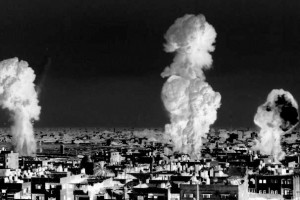
Israel’s Continued Disproportionate Use Of Force Against Palestinian Civilians
In a slow escalation of violence in the Gaza Strip, the Israeli Army responded earlier this month by launching “Operation Protective Edge” as Israeli jets dropped hundreds of bombs on the impoverished coastal enclave of nearly 2 million Palestinians. At this time, more than 200 Palestinians have been killed and more than 1400 injured. According to the United Nations, 77 percent of those killed are civilians and yet the massacre sadly continues. The vicious attacks are framed as a mutual conflict or exchange of fire. The reality is that the low quality rockets hitting Israel are not comparable to Israel’s powerful military strikes.
Phil Weiss:
- In a nutshell I think Israel is trying to destroy the unification agreement between Hamas and Fatah. They don’t want diplomacy they want to end that unification deal.
- It’s a great danger to Israel that the Palestinians are united, they want them divided.
- They’ve used any pretext they can in the last month including the horrifying abduction and killing of these Israeli teens on the West Bank. They’ve used any pretext they can to break up, to try to break up that understanding.
- The goals of a unified Palestinian government are to achieve some type of Palestinian freedom.
- They would go on to International Criminal Court, International bodies and say hey, this occupation has been going on nearly 50 years . .. are you finally going to give us a state, sovereignty? If we can’t get sovereignty we’ll move to an equal rights struggle. .
- I think the good thing that they show is there’s no green line. Israel operates with impunity, with complete autonomy all over historic Palestine. Netanyahu has said we’re never giving up the West Bank. It’s sort of an announcement to the world, this is one state.
- The legal response and the one you demonstrated (Michael Ratner) against Cast Lead was this is Internationa Humanitarian Law and Human Rights law apply here and Israel should be brought up before International bodies for violating those laws.
- The one form of progress is there’s no ground invasion this time. (this is what he thought at the time)
- Michael Ratner, you and I have a somewhat different relationship to the mainstream press in that I used to be part of it and now and then I have fantasies of getting back in.
- With that proviso, I think there has been a little bit of progress in the mainstream so you have on NBC news, you have words opening that report saying these people are trapped, they have no where to go and its a lopsided conflict. I didn’t hear that around Cast Lead.
- I’m not trying to defend the mainstream so much to say that I feel that there is some real shift going on.
- Michael Ratner: Here’s a question about half-full. Do you want me to call the family that lost 17 kids in the same household in Gaza? That’s not half-full. That’s empty.
- You’re putting me in the position of saying what I’m about to say which is the slaughter of 200 people is different from the slaughter of 500 people.
- Michael Ratner: We’re still counting Phil.
- The Jewish American community is highly responsible for this behavior, for this conduct that’s going on there.
- How useful was that aircraft carrier (Israel) when we were occupying Iraq and we were invading Afghanistan? It wasn’t at all useful to us.
- I think its a burden (Israel) I think it’s a millstone around our necks because it says the United States stance is slaughtering brown people.
- You look at J Street, this great liberal Zionist organization. They’re justifying everything Israel is doing now.
- There’s only a couple of Jewish organizations that stood up and said this is wrong. Jewish Voices For Peace and Jews Say No.
- I think there’s an implicit understanding around the world now about why these people are firing rockets.
- One of things you hear in Israel is the existential threat, in that people are delegitimizing us and I think that’s great news.
- I see more voices talking about this conduct as just beyond the pale. I feel that the world is regarding this as a central human rights issue.
Guest – Philip Weiss, founder of Mondoweiss, longtime journalist and regular contributor to the Nation and a fellow at the Nation Institute. Philip is the author of two books a political novel, Cock-A-Doodle-Doo, and American Taboo, an investigative account of a 1976 murder in the Peace Corps in the Kingdom of Tonga. Weiss is one of the editors of The Goldstone Report: The Legacy of the Landmark Investigation of the Gaza Conflict.
——–
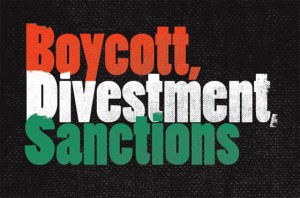
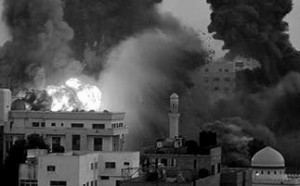
Andrew Kadi:
- I don’t necessarily know that Israel has any real goals that will benefit Israeli society other than possibly the ethnic cleansing of Palestinians in Gaza, forcing them to move out.
- They’re leaving Gazans in deplorable conditions. They have unilaterally absolved themselves of their legal obligation under International law to the population in Gaza and have instead declared something that I think nobody else recognizes that Gaza is somehow a hostile territory or an enemy territory.
- It’s counter-productive if your belief that the goal or the end goal for the Israeli government is peace.
- The majority of these rocket attacks are pretty small projectiles as anyone who has seen them knows has no chance of actually injuring anyone or causing damage. Some of them are as small as a Coke can.
- Hamas has deployed larger rockets in last 4 years that can fire through a building. ‘
- By and large these attacks are being carried out by other groups round the clock. The ones that Israel is referring to are usually other groups that have nothing to do with Hamas.
- I would say the rocket attacks are a cry for help from Gaza.
- In the end, Gazans are isolated, there’s a siege, a blockade that Israel’s carrying out. I think that Gazans don’t want to be subject to it anymore.
- They want to be able to live like any other population.
- The American Foreign Services committee published a list of American companies directly involved and complicit in the attacks on Gaza.
- Those companies include Boeing, Hewlitt Packard, Elbit Systems, Lockheed Martin, General Dynamics, General Electric, Northrup Grumman, Raytheon.
- In 2005, Palestinian civil society called for a Boycott, Divestment and Sanctions against Israel until it complies with the 3 tenets of International law.
- The end of the occupation, equality for the Palestinian citizens of Israel and the right of refugees to return to their homes.
- Other companies that folks can boycott, Sodastream, Ahava cosmetics, Strauss Group, Osem – Tribe Hummus, Sibeon Company.
Guest – Andrew Kadi, a human rights activist and digital media specialist currently serving on the Steering Committee of the US Campaign to End the Israeli Occupation. He’s contributed to the Guardian’s Comment is Free, The Electronic Intifada, Mondoweiss, Left Turn and other publications.
————————————————————
CIA Sponsored Terror, Civil Liberties, Criminalizing Dissent, FBI Intrusion, Habeas Corpus, Human Rights, Political Prisoner, Surveillance, Truth to Power, War Resister
Podcast: Play in new window | Download
Updates:
- Socialist Wins Seat on Seattle City Council
—–
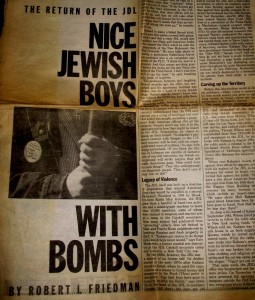
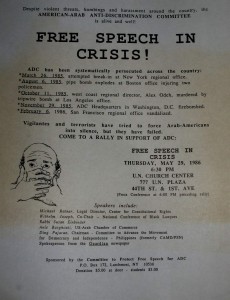
Alex Odeh Case – Abdeen Jabara
On October 11, 1985, prominent Palestinian-American leader Alex Odeh was killed by a pipe bomb at the offices of the American-Arab Anti-Discrimination Committee, where he worked as the group’s western regional director in Santa Ana, California. Now, the FBI and Justice Department are being urged to renew its investigation into this shocking political murder. history.
Very quickly, the FBI named the militant Jewish Defense League, or JDL, as a focus of its investigations. Yet, more than two decades later, no one has been questioned or indicted for Odeh’s murder. Today we welcome back civil rights attorney Abdeen Jabara who helped found the American-Arab Anti-Discrimination Committee. He joins us to talk more about the reopening of this political murder investigation 28 years later.
Attorney Abdeen Jabara:
- The FBI says the case has not been closed and its an ongoing investigation.
- We’re talking about 28 years after the fact.
- Congresswoman Sanchez from Orange County, California from the 46th district wrote a letter to Eric Holder and to the FBI requesting some closure on this case and she got back a very unsatisfactory reply.
- She has joined with several other Congress people, John Conyers of Michigan and others to ask for hearings in the Judiciary Committee of the House on this case.
- There have been many ups and downs in the case since Alex was killed.
- Several people have been arrested in the case but not for the assassination of Alex Odeh.
- The JDL was created in 1968 by Meir Kahane.
- Chairman of our organization, Jim Abarez was contacted by the FBI and was told that he, myself and two other individuals were placed on a hit list by the Jewish Defense Organization.
- Prior to the killing of Alex Odeh, there were a number of incidences. We had our regional office in Boston burned. We had attacks here at our office in New York City. A number of telegrams, threatening calls, all types of harassment was occurring on a daily basis and then Alex Odeh was killed.
- He left 3 beautiful daughters and a widow in Orange County and they are active to this day and his brother is active in trying to maintain the pressure to keep this case alive and bring justice about.
- The Israeli government has not been cooperative with this FBI investigation.
- The fact of the matter is that Arab-Americans have little or no political power in this country.
- I think there is a possibility of movement and we need to have people contact Eric Holder’s office. The FBI is part of the Justice Department, the FBI is responsible for investigating these cases.
Guest – Attorney Abdeen Jabara, co-founder of the American-Arab Anti-Discrimination Committee.
——
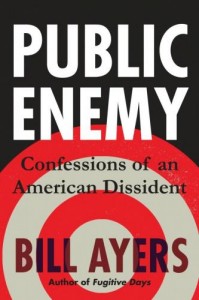

Public Enemy: Confessions Of An American Dissident
A sequel to Fugitive Days, Public Enemy: Confessions of An American Dissident chronicles Bill Ayers life after the Weather Underground. Since his memoir Fugtive Days was published September 10, 2001 about his life in Students for a Democratic Society and later the Weather Underground, Ayers was under attack by right wing media which tied him to the catastrophes of 9/11 based on a New York Times interview quote. Bill Ayers became famous in the early 1970s as a leader of the Weather Underground; he is known to have participated in the bombings of New York City Police Department headquarters in 1970, the US Capitol building in 1971, and the Pentagon in 1972. He surfaced in the mid-1970s, when the government charges against him were dismissed for prosecutorial misconduct.
His new book Public Enemy starts during the 2008 presidential debate in which his neighbor Barack Obama in the Hyde Park community of Chicago was confronted about their association. The book also describes how Ayers and his wife Bernadine Dohrn rebuilt their lives as public figures. Ayers became a professor of education at the Chicago campus of the University of Illinois.
Bill Ayers:
- The American dissident part came pretty naturally. I grew up in the heat of the civil rights movement.
- I came of age when the world was on fire.
- In our own country it was the black freedom movement finding the moral agenda for the whole nation and I found myself drawn inexorably into it.
- The public enemy part comes from continuing to live a long life as a radical, and as a public radical and not being willing to trim my sails or my revolutionary hope stream spirit.
- Come the 2008 election, the national election. I was thrown unwittingly, unwillingly into that national campaign.
- The narrative that Barack Obama palled around with terrorists, that Barack Obama had a shady Palestinian friend or the narrative that he hung around with a black nationalist preacher, that narrative was spun by Hilliary Clinton long before Palin and McCain picked it up.
- The ole American favorite past time, guilt by association, that’s how I became a public enemy.
- I was a kid coming out of a privileged background. I went to the University of Michigan and I couldn’t sleep for about 2 years because the world was on fire.
- I was arrested opposing the war in Vietnam. I spent ten days in county jail and there I met a man whose wife just founded a freedom school.
- I marched out of jail into my first teaching job. For me teaching was always linked deeply with the quest for social justice. I returned to teaching in 1978, after our first child was born.
- The ideal is that every human being is of incalculable value in a country that found on the idea that we are all equal.
- What we ought to be demanding is an educational system that creates free people, people with minds of their own, people who are able to interrogate the world before them.
- In Nazi, Germany, they had wonderful schools that taught amazing literature and music, arts and so on, and they also had a system based on obedience and conformity and doing what you’re told and following the rules. That’s a recipe for catastrophe in any free society.
- What I’ve spent most of my adult life doing is fighting for an educational system where the fullest development of each becomes the condition for the full development of all and the fullest development of all becomes the condition for the full development of each.
- Who are you? How did you get here? Why are you in the freedom movement? What are you trying to accomplish and where do you want to go? The message of those questions are revolutionary.
- The Highlander Folk School
- We don’t have a king that can save us. We are sovereign.
- Those of us who still think of ourselves as revolutionaries living in difficult times, dark times, have to find ways to become movement builders. Movement building is on the agenda. Bringing those together who are working in various fields to change the frame of the discussion.
Guest – William Ayers, Distinguished Professor of Education and Senior Bill Ayers University Scholar at the University of Illinois at Chicago (retired), member of the executive committee of the Faculty Senate and founder of both the Small Schools Workshop and the Center for Youth and Society, taught courses in interpretive and qualitative research, oral history, creative non-fiction, urban school change, and teaching and the modern predicament. A graduate of the University of Michigan, the Bank Street College of Education, Bennington College, and Teachers College, Columbia University, Ayers has written extensively about social justice, democracy and education, the cultural contexts of schooling, and teaching as an essentially intellectual, ethical, and political enterprise.
——————————————————————–
Civil Liberties, Gaza, Human Rights, Targeting Muslims, Torture, Truth to Power, War Resister
Podcast: Play in new window | Download
Updates
—
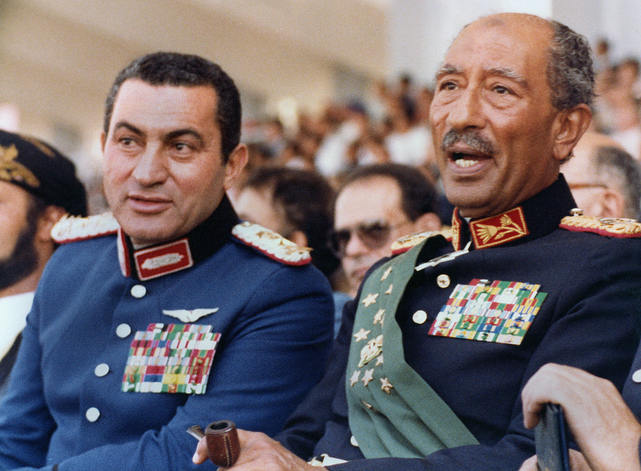

Egypt’s Aftermath and Continued Arab Protests
Civil rights lawyer and former president of the American-Arab Anti-Discrimination Committee, Abdeen Jabara joins co-host Michael Smith in the studio. Jabara gives an update and analysis on the current political and economic shifts in Egypt. Meanwhile Israel recently celebrated the day it declared independence on May 14, 1948, the Nakba. More than 60 years later, Palestinian descendants remain the central issue within the Israeli Palestinian conflict. Last week a wave of coordinated Arab protests hit Israel on 4 of its borders. Protesters were shot and killed when they clashed with Israeli forces at the Lebanon, Syrian, West Bank and Gaza borders.
Abdeen Jabara:
- There’s been a break down of law and order in Egypt, there’s been a rise in the crime rate.
- There’s been a huge drop in income from lack of tourism. There have been various strikes, and even the police went on strike demanding higher wages. People have broken out of various prisons. The situation is very much in flux.
- Two sections of an Egyptian elite maintain control over popular forces.
- There were those that were the nouveau riche, that were being promoted by Gamal Mubarak.
- Many of them have been arrested and are in jail for ill-gotten gains.
- One of the most serious problems in Egypt have been, this neo-liberal development where they were trying to sell off state owned business.
- Open Door Policy, wanting Egypt to become part of the Western camp.
- Will there only be change in a cosmetic fashion where there is no change in the basic relationship with the people. That is the real issue.
- I think a lot depends upon the Army. Egypt is a very poor country and its main sources of income other tourism is the Suez Canal, finished clothes and canned goods.
- Under the Mubarak leadership in order to go on strike you had to get permission from the executive council of the trade union movement. Since the fall of Mubarak, you’ve seen much more labor activism.
- We will be seeing Europe and the United States pouring money into the various formations in the country.
- Israel and Palestine: I think we’re going to see something new now, with all this turmoil.
- We have to understand that the Europeans have been developing some distance on the Middle East issue. The United States and Israel are becoming more isolated in the world. The United States has never been an honest broker in this situation.
- Flotilla will leave in latter part of June, will have ten boats from different European and North American countries. Wednesday May 25, Flotilla Fund Raiser – UStoGaza.org
Guest – Abdeen Jabara, civil rights lawyer and former president of the American-Arab Anti-Discrimination Committee.
——

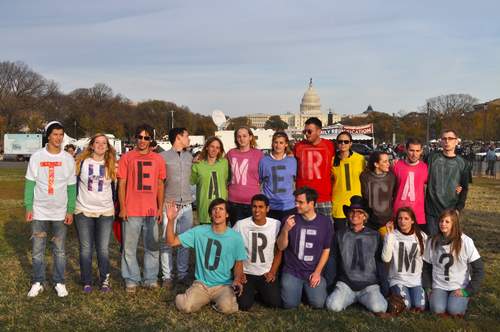
The American Dream As We Know It Is Obsolete
Will the Wisconsin and other state union protests be a catalyst for a general strike? Right now, the Wisconsin demonstrations are aimed at restoring collective bargaining rights for public servants, the goal to a middle class. Reject the opiate of the middle class idealism says our next guest. The revolution must be carefully thought out and be modeled on the ground breaking uprisings in the Middle East and North Africa. How could unions prepare their strategy to include a broader support base? Unions could build alliances with single mothers, the poor, immigrants, the elderly and a wide range of groups.
Arun Gupta:
- It bugged me as all these progressives defended the middle class. I’ve been studying the Tea Party lately. Is the middle class really under attack? The core of the Tea Party is middle class, very entrepreneurial, than more management supervisory.
- There’s a duel movement going on with the Republican attack. Social welfare and public sector jobs.
- In Wisconsin, a population of 5 million, there are 200 thousand public sector jobs
- We should expand our notion of who are defending and what are we fighting for?
- I think Krugman is the most egregious, he says the 1950s was era without great extremes of wealth and poverty.
- Really? There were no Rockefellers and sharecroppers in Mississippi?
- How do we understand the 1950s? We have to go back to the term corporatism. Corporatism doesn’t mean corporation, its derived from corpus meaning body. The government is a mediator between significant sectors of society.
- American capitalism had needed the domestic market. Corporations don’t need internal consumption anymore.
- Capitalism has unmoored itself from geography. For high speed rail in the US, who will build it? The companies that are the most advanced are in China, Germany and South Korea.
- If Obama wanted to spend billions on high speed rail, the US doesn’t have the base, the human intellectual base to compete with Germany and South Korea. We’d have to put tariffs on their goods then you raise the scenario of a trade war.
- Then we’re back in the 1930s which brought on the war. People are not really thinking about the hidden ideologies of green jobs and defending the middle class.
- I’ve seen hopeful potential, these movements pop up and recede so quickly. The immigrants rights movements.
- During revolutions, it is something wonderful, people want to become better people.
- What we don’t hear much about are the little Mubaraks in Egypt, in factories, the workplace, dictators all over the place, and they’re being ousted.
- The Right likes mass movements like the tea party, the Democrats hate mass movements.
Guest – Arun Gupta, Founding editor of the The Indypendent. He recently wrote The American Dream As We Know It Is Obsolete: Why progressives need to think beyond the mantra of creating a “middle class America.”
——————————————————————————













